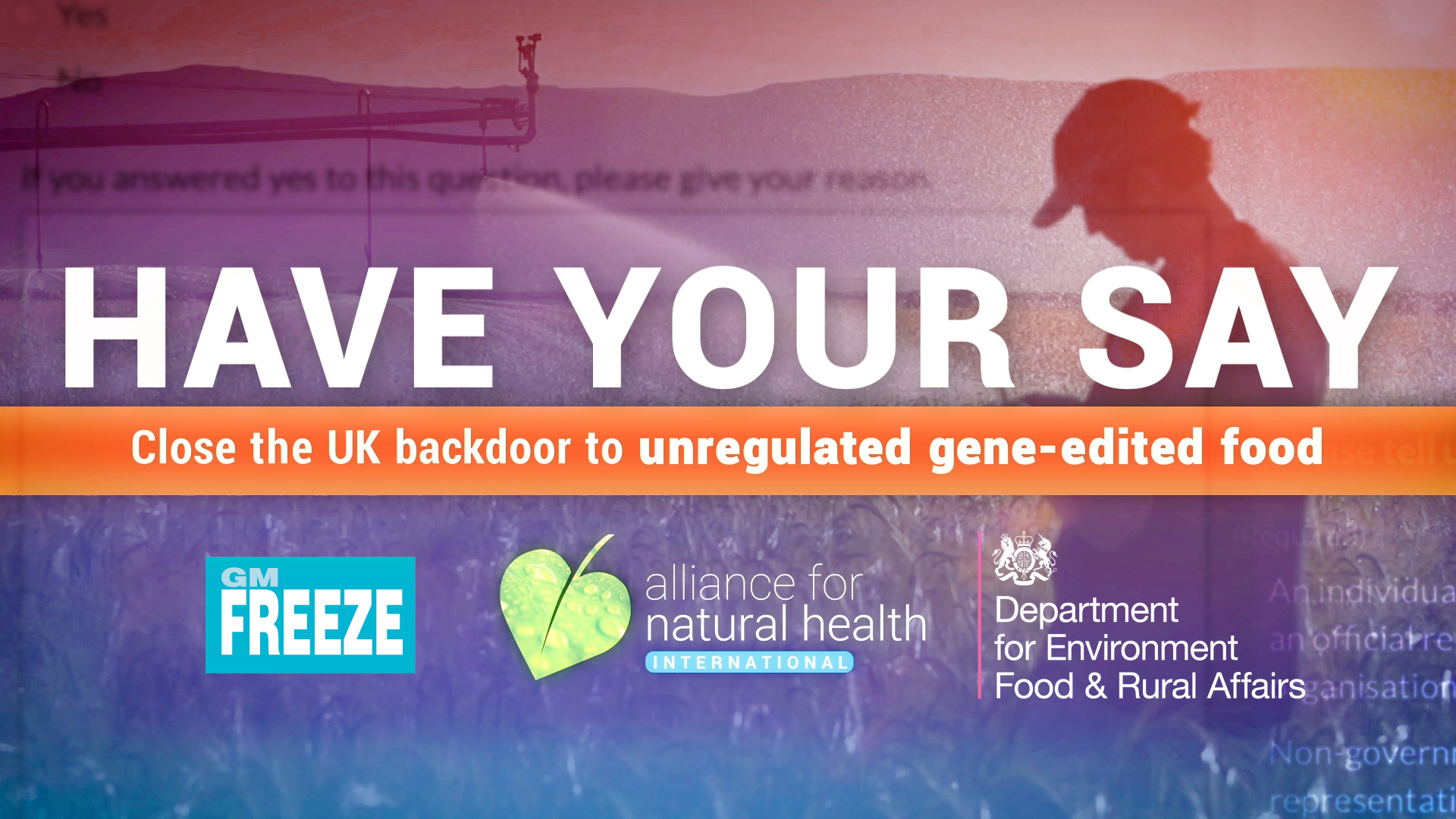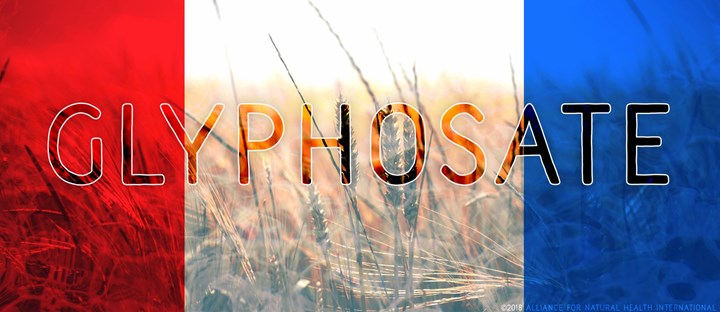Content Sections
We have entered the world of artificial biology – good and proper. Whether it’s the global, mass roll out of covid vaccines containing synthetic RNA or mRNA, or the next generation of foods or farm animals, humans are increasingly toying with the genomes that contain the codes for life on our planet. Often with little idea of what the long-term implications might be. Or much in the way of dialogue with the public over the huge socioethical, environmental, health and even geopolitical implications.
Asking the public over a nearly-done deal
With the agritech industry poised to use the latest genome editing technology, CRISPR, on a mass scale in agriculture, the UK government is planning to deregulate gene-edited crops and farm animals. It considers this a viable option in the wake of Brexit, having released itself from the typically precautionary and onerous EU regulations governing the genetic modification of food and feed for outdoor release.
The UK government, through the responsible authority, DEFRA (the Department for Environment, Food & Rural Affairs), is asking British citizens and residents to respond to its consultation before one minute to midnight on the 17th of March 2021.
This is the public and businesses one chance to express views on whether they will accept genetically engineered organisms - GEOs – ‘through the back door’. Without the need to either prove they’re safe to people or wildlife, or to tell us on labels that the products contain GEOs. In the process, creating an ever greater number of patented, modified forms of nature, the intellectual property of which is owned by Big Agritech.
Perversely, DEFRA and government representatives running as high up the ladder as the Prime Minister, appear to already have made up their minds to deregulate. In an interview on BBC Radio 4 on 3 March,
Pat Thomas, head of campaign group Beyond GM that has filed a complaint to DEFRA over its handling of the consultation said:
“There are some very well-established Cabinet Office principles about consultation. And we believe that a number of these principles have been breached. Primarily, consultations should have a purpose. The government for instance shouldn’t be consulting for the sake of it or on issues on which it has already formed a final view. And it seems very clear from the messages that have been going out for instance from Prime Minister Boris Johnson and from DEFRA itself are that the government is absolutely minded to deregulate gene-editing and now we’re simply talking about how we’re going to do it.”
If only it was that simple
The planned escape of Big Biotech from existing GMO legislation is the use of novel gene editing techniques that result in gene edits that could have been achieved through traditional breeding programmes.
Unfortunately, it’s not as simple as that - and that’s a whole new can of gene-edited worms, one that could lead to a plethora of unintended downstream negative effects on people, plants, animals and even microbes.
Up until now, gene-edited crops and animals have been regulated primarily by EU GM laws, which were retained in the UK before Brexit. An important piece of EU case law passed in 2018 following a case brought against the French government by concerned groups (Confédération paysanne and others), cemented in European law the view that gene edited organisms should continue to be regulated in the same way as other GMOs.
This is because, after a 2-year review of all the available scientific evidence, gene editing was found to pose similar risks of unintended consequences on human health or the environment.
Current laws mean that genetically engineered plants and animals need to be evaluated for their safety before being authorised for use. It also means they need to be labelled as GMOs, whether used for human food or animal feed, with very limited exceptions.
“The UK government now…wants to open the back door to agritech companies so that they can use their shiny new CRISPR technology to edit the genes of crops and farm animals without having to tell the outside world. Or having to test the safety or environmental impact of the genome edits conducted in the privacy of their labs.”
Slippery slope
The UK government now considers these laws out of date and too restrictive. It wants to open the back door to agritech companies so that they can use their shiny new CRISPR technology to edit the genes of crops and farm animals without having to tell the outside world. Or having to test the safety or environmental impact of the genome edits conducted in the privacy of their labs.
This is a very slippery slope. It demands that we place huge trust in companies that have no automatic right to our trust. From a sector that has, for 30 years, made huge promises, and delivered so little benefit, while contributing to the loss of biodiversity and substantially increased input of herbicides like glyphosate.
Not only that, it’s also taken ever greater proprietary ownership of the seed and foods we rely on for our survival. In the process concentrating the control of agricultural resources into the hands of ever fewer people or corporations on our planet, and making more and more farmers dependent on seeds and products produced by the few.
If nothing else, the 25-year history of GMO crops is a reminder that we shouldn’t be lured by false promises, but rather we should be mindful of the things we don’t yet understand. While also recognising that the kind of genetic exchanges that nature offers us exist for good reason. They may be slower or even less precise than those that can be delivered with a gene editing gun, but they work on well established principles that have got us to this point in our planetary evolution.
Please respond even if you think you’re not being heard
Nothing less than the health of future generations and the sustainability of our food production systems, farmlands and wild spaces, is at stake if we allow genome-editing free reign.
It’s crucial that as many individuals and companies as possible have their say.
You’ll need to carve out between 5 and 20 minutes of your time to make sure your voice is heard.
We concur fully with the views of the non-profits GM Freeze and Beyond GM which have collaborated to deliver comprehensive guidance on this consultation.
Please consult the excellent guidance on either of these two websites, whether you’ve got only 5 minutes, or a little more time to deliver a more comprehensive – and of course more valuable – response.
We know how easy it is to be disheartened by these consultations, because it might feel like we are not being listened to. But please recognise that if there isn’t a strong response questioning this backdoor policy for genome-editing, legal challenges at a later stage, in the event of damage to humans, farm animals, wildlife or the environment caused by the use of gene-editing techniques, will be much more difficult.
Remaining silent when we are in disagreement with a government policy also reflects apathy for democracy. Just at a time when democracy needs you.
Thank you.










Comments
your voice counts
12 March 2021 at 12:10 am
Is it worthwhile to setup a petition on the government site asking for the government to actually start consultations before the wheels are in motion, rather than just paying lip service to the public by carrying out pointless consultations.
12 March 2021 at 9:33 am
I agree
12 March 2021 at 12:09 pm
The underlying theme or archetype for all of this is 'My will be done - not Thine', that is - the substitution for love by a mind set in image and form 'meanings' that conflict with the resonance and flow of wholeness of being. A 'split-off sense of mind-controlled existence.
We clearly have and are the mind of the capacity to imagine or create along the lines of Our Thought, while also having the awareness as experience of the result of Our Thought - as simply as a resonant match or fit - or balance - AND the dissonance of conflicted thought or contradictory thought.
Do not underestimate the power of the mind in operating from a false presumption!
That a feared outcome can be given 'reality' in the mind of those who confuse it with true Currency of being is most clearly evident!
That the capacity to at least locally override or overlay truth with a narrative distortion can become a habit or addictive masking over of feared truth is summarised by combining fear and truth.
When we give power to fear, we distort or block our awareness, and yet as we bring fears to truth, they are undone of what they SEEMED to be or represent.
The genetic editing technologism is yet an another 'solution' into which to dump or mask all our toxic debt and denial - and therefore experience in the masking frame of the body as a corruption, limit or lockdown and distance of Spirit or wholeness. That we humanly experience a world of sickness and death is evident, but that we lock into it as a mask over denial of its underlying truth, as a further dissociation and displacement from the simple and direct felt knowing or Life Now, is the hostage to a mind control that denies or erases our mind!
Disturbance as a result of Disclosure is ultimately un-mask-able. But the conditions of such raw conflict of heart and mind are the opportunity to look at and question the very foundations of what may reveal to be a Self-evasion running under a mistaken identity.
I may write too abstractly for most - but the gist is to actively choose NOT to persist in allowing the mind of habit to react as if it speaks for who you are now. Bottoming out is where the masking becomes more painful and fearful than the underlying lack, conflict and fear it was supposed to 'save' you from. It is never to late to be reconciled and reintegrated to your life and through that, to those you live with and the world we share.
12 March 2021 at 3:51 pm
Yes I think it is a great idea. ... 'asking the government to actually start consultations before the wheels are in motion', most of the time we lear of them at the last minute.
13 March 2021 at 10:37 am
Thanks John for myself I no longer consent to Government...However if you still do then I think the Idea of Posting something on Gov Website is a great Idea but Not a petition As I perceive it a PETITION is just a formal request (ie asking /Begging this is a mind control blind a Petition carries no real weight) you CONSENT OR LACK OF IT carries Weight
So if you do not agree with something you need to state I /WE DO NOT CONSENT By the way If your name is on the Electoral Roll the Gov Assume YOU HAVE ALREADY CONSENTED to everything they do unless you tell them that you do not (I was so shocked when I discovered this that I am in the process of removing my name from said Roll )
Why don't I consent to Goverment ?
Well the clue is in the name GOVERN means ...To CONTROL and
MENT from Menta meaning MIND.... so put it together And what does GOVERNMENT Mean yes
MIND CONTROL (Ta da! Thanks Mark Passio )...just like the media..(and I prefer to control my own mind as far as I am able though still parts are in the debriefing phase!)
As Binra reminds us 'Choose love over fear '..(at least I think that was part of it)
Thanks Binra..not sure I understand the totality of your missive I shall reread a few times later...perhaps it is also a bonding exercise.... some understand that each Conciousness creates the world...I believe it to be the collective unconscious at least at present
Love and Light xx🙏🏼
17 March 2021 at 8:00 am
I do not consent to the government introducing more poisons into the food chain. Any consumables must be transparent in their origin. The current and future health of the nation depends on best quality food - not manipulated, cancer causing substitutes that cause all manner of allergies and diseases. It's all about big pharma making profits. No profit in a healthy nation...
14 March 2021 at 2:41 pm
I have just put together my comment on the consultation:
Response to consultation ‘The regulation of genetic technologies’
This document is couched in up-side down language which some might term Orwellian:
1) It is actually about the deregulation of genetic technologies
2) It represents this as a “green” policy when it is patently an opportunistic attack by an industrial lobby on our natural environment, and upon bio-diversity. It could not be more anti-green in any way that could normally or traditionally be understood
3) Previous moves of this kind globally have left small and medium landholders at the mercy of grasping, unscrupulous manufacturers
4) If part of the argument is that the putative advances could also be achieved without GM technology, why do we need GM at all? This is not a credible explanation for changing the law
5) If GM is deregulated the only people the manufacturers will be answerable to is their shareholders, so how is the public interest represented?
6) I tried taking the survey but found it full of leading questions
It is shocking that this matter is not being raised in an openly democratic manner. While the British public have always rejected GM produce to the extent that it is presently unsaleable in our country, deregulating it was never conspicuously brought up as a reason for leaving the European Union at the time of Referendum in 2016 or at the December 2019 General Election: the only time I recall this project being mentioned was the Prime Minister’s speech on entering Downing Street in July 2019. This is a radical departure for the UK but the public are being cynically kept out of the picture - although there is the present consultation you will not read or hear about it in the mainstream media. One can deduce that the reason for this is that if it was adequately reported it would be overwhelmingly unpopular.
The slogan ‘Building back greener’ used in the document derives from the World Economic Forum who are also putting it out that in ten years-time no one but a tiny global elite will own anything but “will be happy”. If the government is dancing to the tune of the Great Reset perhaps it should tell the public who elected it where it is heading because no one could have imagined little more than a year ago what they were voting for. So much for Margaret Thatcher's property-owning democracy recently reiterated by the Prime Minister while apparently hooked into an alternative, techno-feudalist, ideology. What now are we to believe either about the environment, safe food, property or democracy?
John Stone, UK Editor, Age of Autism
15 March 2021 at 12:25 pm
This is so loaded as to be useless as a vehicle for 'public' comment. I started answering the questions, then was asked to provide 'evidence' to support my responses. I am simply a member of the public who cares about these matters. I cannot provide scientific or documented evidence to support my point of view. I quickly gave up in disgust. It is a sham exercise in public consultation.
16 March 2021 at 1:07 pm
Hi there, if you visit the GM Freeze website they provide all the answers and information you need to resond to the consultation via email - https://www.gmfreeze.org/gene-editing-consultation/.
Thank you for your support.
Warm regards
Melissa
16 March 2021 at 9:55 am
This petition is a minefield, deliberately created to cause obfuscation and make it almost impossible to complete
16 March 2021 at 1:08 pm
Hello Isabel
The GM Freeze website provides all the answers and information you need to resond to the consultation via email - https://www.gmfreeze.org/gene-editing-consultation/. They've made it quick and simple for members of the public to have their voice heard.
Thank you for your support.
Warm regards
Melissa
Your voice counts
We welcome your comments and are very interested in your point of view, but we ask that you keep them relevant to the article, that they be civil and without commercial links. All comments are moderated prior to being published. We reserve the right to edit or not publish comments that we consider abusive or offensive.
There is extra content here from a third party provider. You will be unable to see this content unless you agree to allow Content Cookies. Cookie Preferences